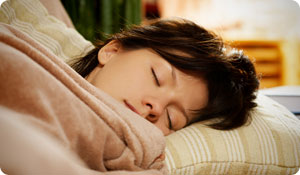
Is street noise keeping you up at night? Loud neighbors interrupting your sleep? Block disruptive sounds with soothing white noise.
White noise machines, also known as sound conditioners or sound soothers, help lull you to sleep with a low, steady hum or relaxing, "natural" sounds from nature. White noise works because it minimizes fluctuations in noise by providing a steady sound that blocks or neutralizes sounds that are more penetrating. It provides "ambient sound," otherwise known as background noise and reduces the difference in varying sound levels that can disrupt sleep.
Think of a waterfall falling, rain trickling down, an ocean surf rolling in or the sound of a heartbeat. There's a steady, soothing rhythm to these sounds that are conducive to a good night's sleep. Though not as pretty, the low, steady noise of a blow dryer, vacuum cleaner, or any air blowing, could have the same effect.
Most clinical studies measuring the effect of white noise on sleep have been performed on infants, ill patients trying to sleep in hospitals, or people with noise-sensitive medical conditions such as tinnitus. In all cases, the introduction of white noise improved the duration and quality of sleep. In a small British study of newborns published in a 1990 issue of the journal, Archives of Disease in Childhood, researchers found that the infants were three times as likely to fall asleep with white noise in the background as without.
If you own a fan, or are considering buying an air purifier that will be used at night, you may not need a separate machine to produce white noise. Unless you specifically seek out quieter models, running fans and air cleaners make their own version of white noise.
Another way to block disruptive sounds is with music or sound DVDs. Steady music, with no lyrics or strong melody, such as Baroque music (by such composers as Bach, Handel, Corelli, Vivaldi and Telemann) can have the same soothing effect as a white noise machine or recorded nature sounds when played at a low volume.
Even people who are not bothered by outside noise while trying to sleep often find it easier to doze off to soothing sounds. In fact, once you learn to fall asleep to the chirping of birds, the sound of music, or the hum of electronically produced rhythms, you may find it harder to sleep without them.
Sources:
Handscomb, L. "Use of Bedside Sound Generators by Patients with Tinnitus-Related Sleeeping Difficulty: Which Sounds are Preferred?" Acta oto-laryngologica. 2006 Dec; (556): 59-63. Web. 21 Oct 2010
http://www.ncbi.nlm.nih.gov/pubmed/17114145
Richards, K. et al. "Use of Complementary and Altenrative Therapies to Promote Sleep in Critically Ill Patients." Critical Care Nursing Clinics of North America. 2003 Sep; 15(3): 329-40. Web. 21 Oct. 2010.
http://www.ncbi.nlm.nih.gov/pubmed/12943139
Spencer, JA, et al. "White Noise and Sleep Induction." Archives of Disease in Childhood. 1990 Jan; 65(1): 135-137. Web. 21 Oct 2010.
http://www.ncbi.nlm.nih.gov/pmc/articles/PMC1792397/
Stanchina, ML, et al. The Influence of White Noise on Sleep in Subjects exposed to ICU Noise." Sleep Medicine. 2005 Sep; 6(5): 423-8. Web. 21 Oct 2010.
http://www.ncbi.nlm.nih.gov/pubmed/16139772





